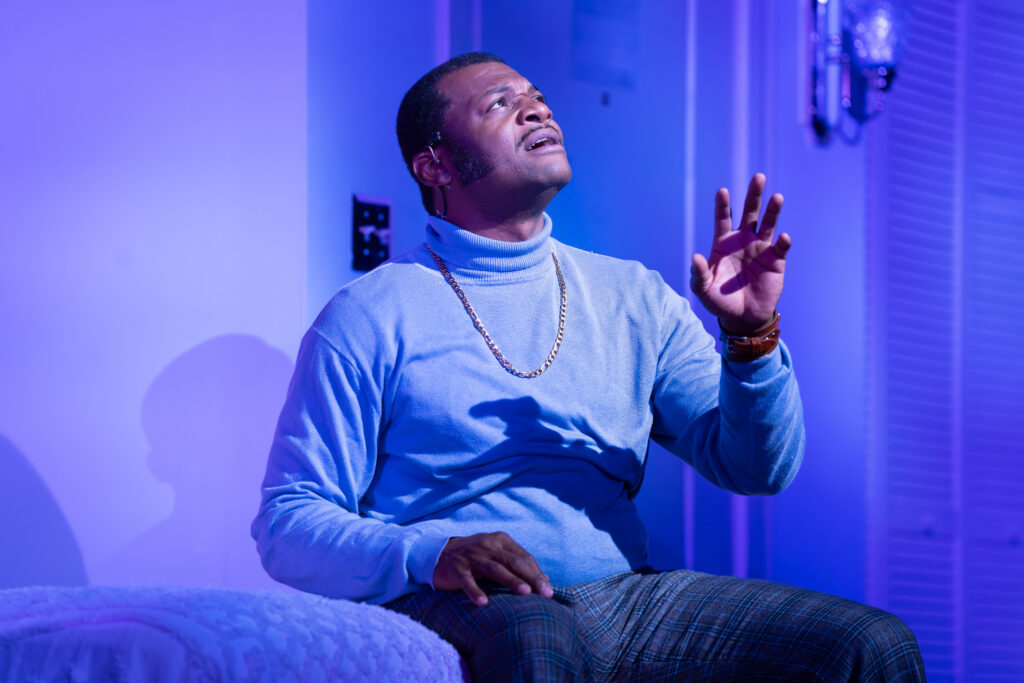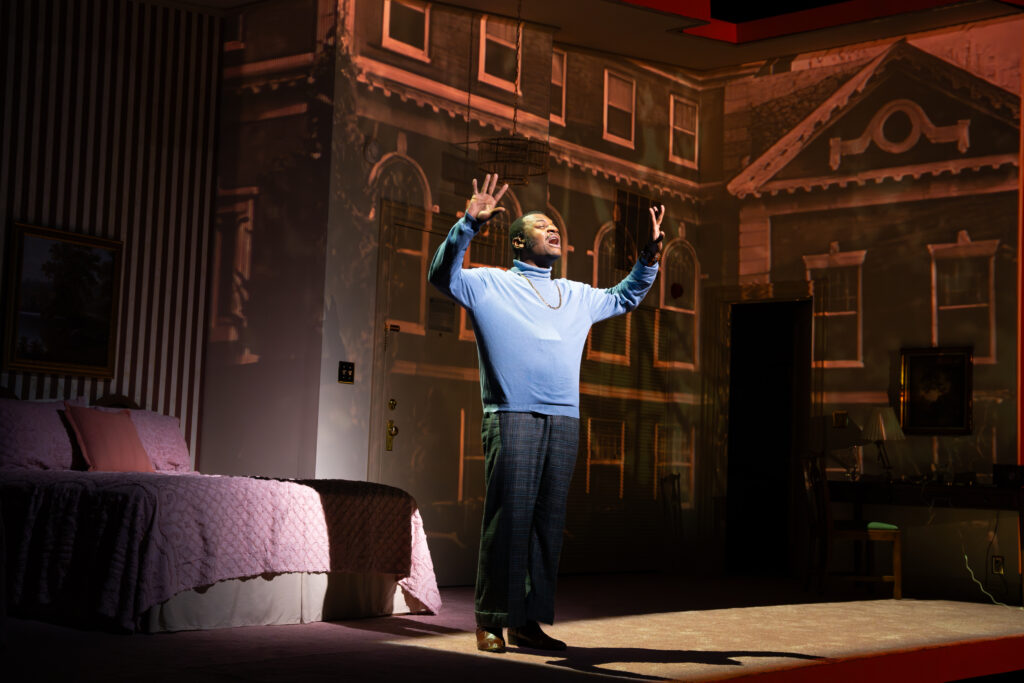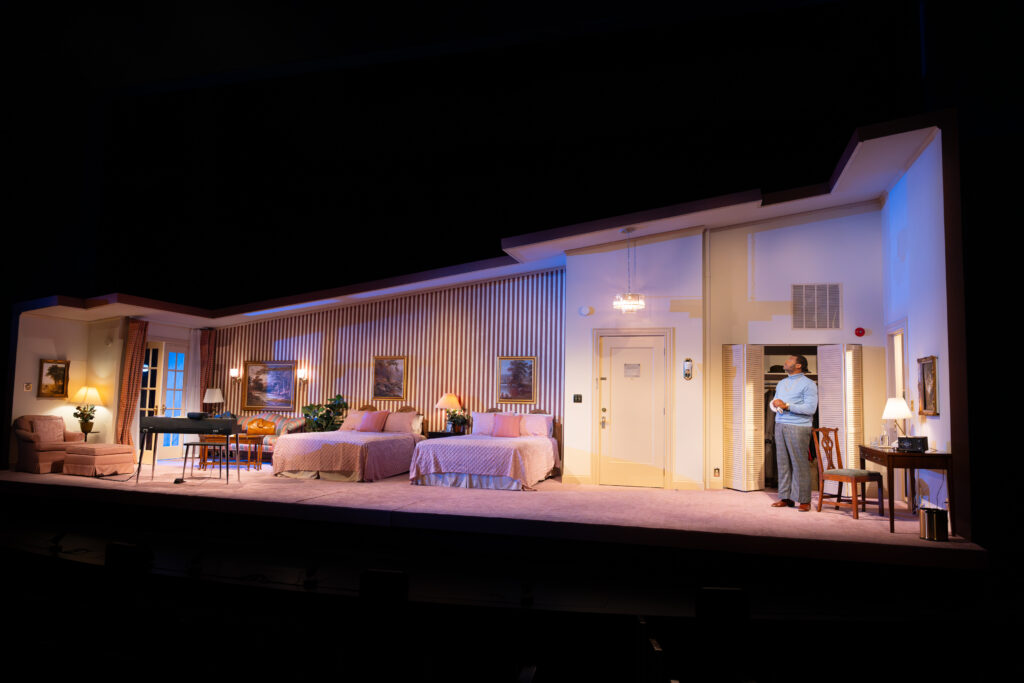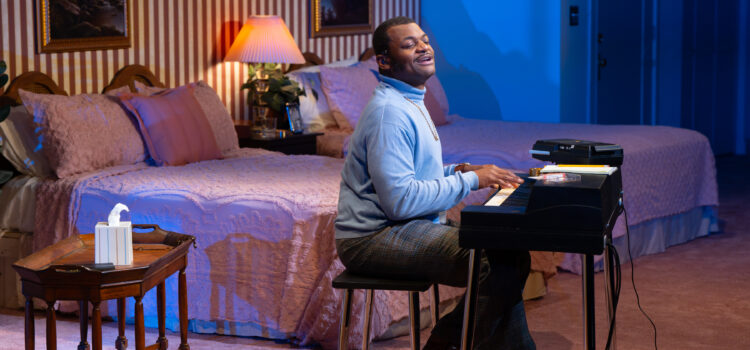By Lynn Venhaus
Singer-actor Kelvin Roston Jr. is a man on a mission, and he pours his heart and soul into a revealing portrait of soul singer Donny Hathaway.
However, his haunting one-man show “Twisted Melodies” is more than a bravura performance – he shines the spotlight on complicated mental health issues to lead us to further understanding.
Sure, you’ve heard Hathaway’s music – at least every holiday season “This Christmas” is playing in stores, on car radios, and at home. His signature cover of Leon Russell’s “A Song for You” is considered one of his finest, as is John Lennon’s “Jealous Guy,” and his duet with Roberta Flack on “Where Is the Love?” won a Grammy Award in 1973.
The audience acknowledged familiarity with his first hit, “The Ghetto,” from his album debut “Everything Is Everything” in 1970 as soon as it played. After all, Hathaway was born in St. Louis on Oct. 1, 1945, and has a deep fan base here.
Hathaway was raised by his grandmother Martha Pitts, a professional gospel singer, in the Carr Square housing project. He graduated from Vashon High School in 1963, and earned a fine arts scholarship to Howard University, where he majored in music theory.
Because of his illustrious career and enduring impact, he was inducted into the St. Louis Walk of Fame in 2013. His star is located at 6165 Delmar Blvd. in University City.
But what was happening behind the music is a tragic story that silenced his expressive voice. The gifted musician and songwriter suffered from mental illness. At age 33, he plunged to his death from an Essex Hotel window in Chicago on Jan. 13, 1979.

This captivating, mournful story takes place on that fateful day inside Hathaway’s hotel room — and inside his head – as he battled demons his adult life. A paranoid schizophrenic, he wasn’t keen on keeping up with a rigorous prescription medicine route, and therefore, his behavior became increasingly erratic.
In a devastating scene, he described all the unpleasant side effects of the pills he was prescribed. Those who loved him could not help.
Roston conveys both Hathaway’s talent and his torment in a heartfelt and heartbreaking performance, displaying his expert musicianship and his powerful voice. He deeply feels the music.
Roston, who is also from St. Louis but currently based in Chicago, began shaping the play when he was an intern at the Black Rep. Caring so passionately about this man and his music, he brought this personal story to the Black Rep in 2016 – and was nominated for a St. Louis Theater Circle Award for Outstanding Actor in a Drama. Since the world premiere in 2015 in Chicago, he has taken his show across the country.
Roston, who attended Cardinal Ritter High School, recently won a Joseph Jefferson Award in Chicago for Best Actor for his performance as “King Hedley II,” August Wilson’s play staged at The Court Theatre.
In his courageous portrayal, Roston brings out Hathaway’s caring, vulnerable personality by reminiscing about his childhood, college years, collaboration with Flack, meeting his wife, and the love for his daughter.
He also flips quickly to indicate a darker force, an all-consuming inner turmoil, as he is convinced someone is stealing his music by hooking up his brain to a machine.
As he struggles to maintain sanity, we hear discordant sounds, the lights become harsher, and visuals distort. Projection designer Mike Tutaj provides different images on the hotel room walls. Xavier Pierce’s lighting and G Clausen’s sound design add to the heightened emotions.
Set designer Tim Mackabee’s accurate depiction of a tastefully appointed hotel room 44 years ago can appear spacious, then claustrophobic, almost like a prison, while Roston is presenting composing at his keyboard normally, then switching to the terror of Hathaway’s reality.

Throughout the 90 minutes, while music was integrated into the script, Roston’s focus on the disease’s effects is hard-hitting, robbing Hathaway of everything he valued.
This show speaks volumes in a sincere, direct way, and illuminates a crippling disease and urgent health care crisis. It is a public service announcement as much as an entertaining, thoughtful show.
Director Reggie D. White has emphasized both in this presentation, and he has seamlessly incorporated the technical elements so we could be moved not only by Hathaway’s brilliance as a major R&B talent, but also his hellish psychological state.
On opening night Oct. 6, Hathaway’s youngest daughter, Donnita, came on stage afterwards to talk about her father, and commend Roston’s work. She was 2 years old when her father died.
The Rep is partnering with Donnita’s Donny Hathaway Legacy Project that advocates for holistic mental health and emotional health-related education and resources. The Rep has pledged to partner its onstage work with a necessary offstage issue.
She had said earlier: “I’m in awe of how much care and delicacy the brilliant Kelvin Roston takes in his role as my father while staying true to highlighting mental health issues during this fateful night and balancing the scales by taking us down memory lane by infusing the classic musical catalog that Donny Hathaway left us. I am thrilled that Twisted Melodies is coming to The Rep, a place that both Kelvin Roston and the late Donny Hathaway could call home.”
Post-show discussions are set for Saturday, Oct. 14 at 4 p.m. and Wednesday, Oct. 18 at 2 p. m.

The Repertory Theatre of St. Louis presents “Twisted Melodies” Oct. 4 -22 at the Catherine B. Berges Theatre at COCA, 6880 Washington Avenue. For more information or to purchase tickets, visit: www.repstl.org
The Rep Box Office is available for in-person support at the Loretto-Hilton Center, 130 Edgar Rd., Webster Groves, on Tuesdays and Wednesdays from 10:30 a.m. – 5 p.m, and 2 hours before curtain.

Lynn (Zipfel) Venhaus has had a continuous byline in St. Louis metro region publications since 1978. She writes features and news for Belleville News-Democrat and contributes to St. Louis magazine and other publications.
She is a Rotten Tomatoes-approved film critic, currently reviews films for Webster-Kirkwood Times and KTRS Radio, covers entertainment for PopLifeSTL.com and co-hosts podcast PopLifeSTL.com…Presents.
She is a member of Critics Choice Association, where she serves on the women’s and marketing committees; Alliance of Women Film Journalists; and on the board of the St. Louis Film Critics Association. She is a founding and board member of the St. Louis Theater Circle.
She is retired from teaching journalism/media as an adjunct college instructor.

